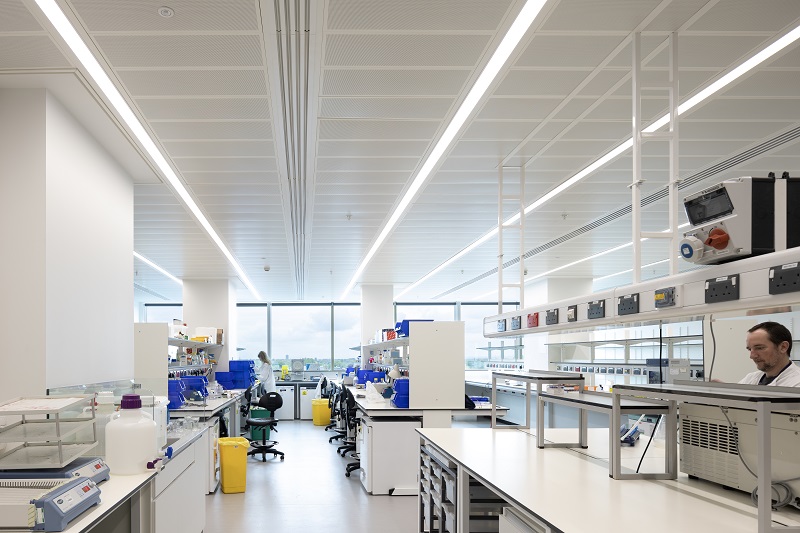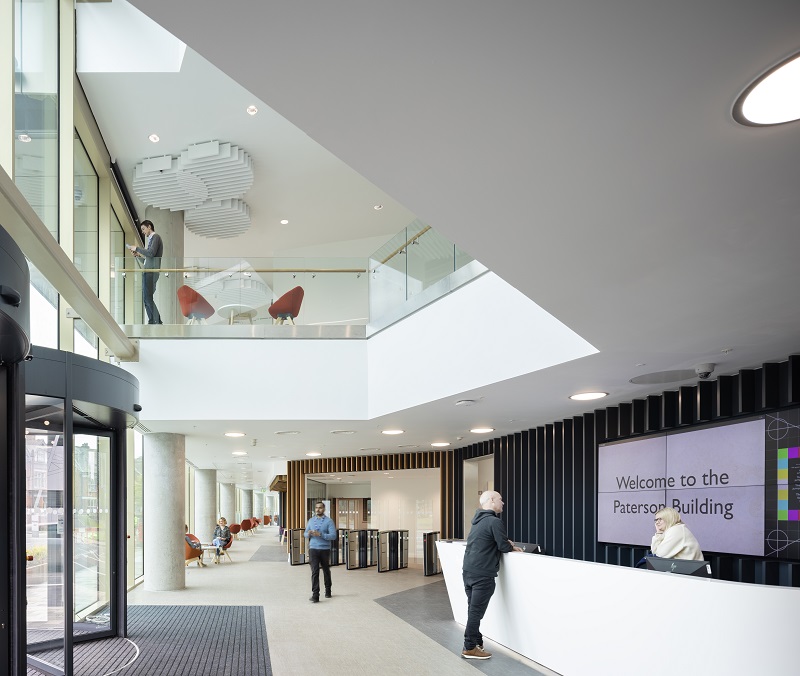A leading cancer centre, which was devastated by fire five years ago, is set to reopen after building work was recently completed at the site.
The Paterson Cancer Research Facility at The Christie NHS Foundation Trust in Manchester is part of the Manchester Cancer Research Centre – a partnership between The Christie, Cancer Research UK, and The University of Manchester.
But much of the building was damaged in a fire in April 2017 when hot debris from welding work being carried out on the roof fell down a wall and set fire to cardboard and fabric.
Now redeveloped, the facility is set to become one of the top cancer research centres in the world.
Integrated Health Projects (IHP), the joint venture between VINCI Building and Sir Robert McAlpine, and its supply chain partners, BDP, Arup, and Imtech have realised a state-of-the-art facility that will lead world-class transformational cancer research.
The building is set to become home to the largest concentration of scientists, doctors, and nurses in Europe, with 300 scientists and 400 clinicians and operational staff, practicing what is known as ‘team science’ delivering clinical trials covering the full extent of the patient pathway, from prevention and novel treatments to living with, and beyond, cancer.
Under one roof
At more than 25,000sq m and 10 storeys high, the building is more than twice the size of the previous facility, allowing experts to deliver discovery research and translate their findings into innovative clinical trials at scale.
The building will be occupied by all three of the partners and will be home to the Cancer Research UK Manchester Institute, as well as several other teams from The University of Manchester’s Division of Cancer Sciences.
It will also be Manchester’s scientific headquarters for discovery science within the international Alliance for Early Cancer Detection.
A central component of the building will be the new Cancer Research UK Cancer Biomarker Centre.
The centre’s focus will be on biomarkers to aid in early cancer detection and diagnosis, and enable personalised management of a patient’s cancer to determine which therapy will bring the most benefit.
Ged Couser, architect principal at BDP, said: “This building adds a striking new addition to the Manchester skyline, delivering a technologically-advanced structure that is already raising the profile of academic collaboration and R&D in the North of England.
The centre will practice what is known as ‘team science’, delivering clinical trials covering the full extent of the patient pathway, from prevention and novel treatments to living with, and beyond, cancer
Great design and flexible spaces
“This project is a prime example of what can be achieved with the right planning, funding, and design to create effective, beautiful, highly-specialised places that impact positively on communities, businesses and local people.
“We are so proud to have worked on the new Christie Paterson and to be witnessing these moments as the building becomes occupied.
“It shows that great design can create flexible spaces which centre on diagnoses, patient care, and vital, world-leading research in a truly-collaborative environment; about which, we are so excited.”
Roger Spencer, chief executive at The Christie, added: “The Christie has been at the forefront of cancer research for over 120 years.
“Standard treatments that were first trialled here have improved the outcomes for millions of cancer patients across the world and this new centre allows us to build on this legacy, so it’s exciting to see the vision become a reality.
World-class treatment
“We want to give every patient who walks through our doors the best-possible treatment and care and having so many different specialists collaborating together under one roof will help us achieve our ambition to make the facility one of the top five cancer research centres in the world.”
And Michelle Mitchell, chief executive of Cancer Research UK, said: “As the world’s-largest charitable funder of cancer research, Cancer Research UK is at the forefront of the global fight against the disease, bringing together millions of people who share our determination to beat it.
“Co-locating the Cancer Research UK Manchester Institute with The Christie fulfils our strategy of delivering scientific breakthroughs which translate into treatments for patients and I’m delighted to see teams moving in and look forward to seeing our researchers find faster routes to new prevention measures, tests, and treatments.”
Together with the Proton Beam Therapy Centre in Manchester, and the Oglesby Cancer Research Building, the new facility will be the latest piece of the cancer campus jigsaw.
Matthew Holden, director and Manchester building engineering leader at Arup, said: “Reflecting the collaboration principles of ‘team science’, our multidisciplinary team has ensured that the new Paterson Building can deliver its pioneering clinical trials while futureproofing it by design so scientific discovery is at its forefront.
“We’re proud to have helped deliver a world-class space which will not only impact the individual through improved cancer treatments, but also accelerate the city of Manchester’s contribution to global medical innovation.”
The building will be occupied by The Christie NHS Foundation Trust, Cancer Research UK, and The University of Manchester, as well as acting as the scientific headquarters of the international Alliance for Early Cancer Detection




